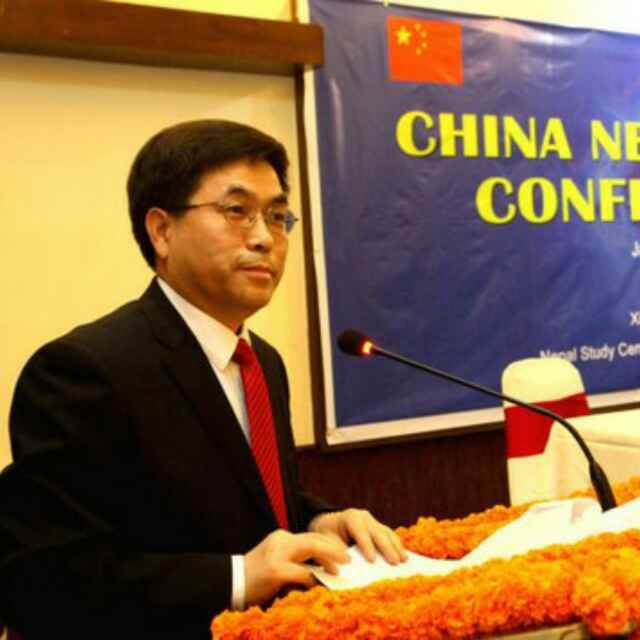 By Zhang Shubin (Beijing, March 21)–For quite some time, Pushpa Kamal Dahal, better known as Prachanda, prime minister of Nepal and chairman of the Communist Party of Nepal (Maoist Center), had been friendly toward China. However, since assuming office for the second time as prime minister on August 3, 2016, he has visited India twice and warmly welcomed Indian President Shri Pranab Mukherjee in Kathmandu last November.
By Zhang Shubin (Beijing, March 21)–For quite some time, Pushpa Kamal Dahal, better known as Prachanda, prime minister of Nepal and chairman of the Communist Party of Nepal (Maoist Center), had been friendly toward China. However, since assuming office for the second time as prime minister on August 3, 2016, he has visited India twice and warmly welcomed Indian President Shri Pranab Mukherjee in Kathmandu last November.
Given Prachanda’s pro-India foreign policy, the Sino-Nepalese relationship has fallen into low ebb. On Thursday, Prachanda will embark on a visit to China to attend the Boao Forum for Asia Annual Conference 2017.
Although the tour takes place toward the end of his second term as Nepal’s prime minister, it is undoubtedly good news for ties between Beijing and Kathmandu.
Based on a power-sharing deal signed by the CPN (Maoist Center) and the Nepali Congress, there are conditions to Prachanda becoming prime minister – the Maoist had to first withdraw from the ruling coalition with the Communist Party of Nepal (Unified Marxist Leninist), CPN-UML for short, which was led by the country’s former prime minister Khadga Prasad Sharma Oli.
Furthermore, Prachanda can lead the government for the first nine months and Sher Bahadur Deuba, the chief of the Nepali Congress, will replace Prachanda and govern the country for the next nine months from this May until January 21, 2018, when Nepal’s federal election will be held and a new federal parliament would be formed.
It is widely believed in Nepal that Prachanda has toppled the pro-China government led by Oli under New Delhi’s manipulation and paved the way for the Nepali Congress to build a pro-India government in the future. Prachanda and Deuba both vowed that they would carry out the deals signed with Beijing during Oli’s China visit last March, but actions speak louder than words. Until today, no substantial progress has yet been made.
Prachanda will transfer his power to Deuba soon after May 14, when the local-level elections will be held. Even if Prachanda would ink some vital deals with Beijing, they will most likely face the same fate of those signed during Oli’s China visit – being suspended by Deuba.
Nevertheless, in order to win more support for his party in the upcoming local elections and dispel the accusation of being pro-India, Prachanda might sign some critical agreements with Beijing this time.
Among them are the construction of Sino-Nepal railway, upgrading the China-Nepal Araniko Highway and the road linking the Gyirong Port in China’s Tibet Autonomous Region and Kathmandu (better known in Nepal as Syafrubesi-Rasuwagadhi Highway), as well as a Sino-Nepalese free trade deal. Yet when examining whether a foreign government or party is friendly to China, implementation of the agreements is more important than signing the deals.
Several projects in Nepal involving Chinese companies, such as Upgrade Kathmandu Ring Road Second Phase Project, the Pokhara International Airport, the Gautam Buddha International Airport in Lumbini and the West Seti Hydropower Project have been consistently blocked for various reasons. China has every reason to require the Nepalese government to safeguard the interests of Chinese investors and contractors.
There are broad prospects of cooperative projects under the framework of the “One Belt, One Road” initiative (OBOR) in South Asia. Nepal should bring its own geographic advantage into full play and proactively integrate into the initiative.
Beijing, New Delhi and Kathmandu ought to abandon the outdated zero-sum mindset, set aside their disputes, agree to disagree, start to seek common interests and strive for prosperity.
Building the road is the first step toward prosperity. Constructions of railways and highways linking China, Nepal and India should be implemented as soon as possible. The Chinese side has submitted some feasibility reports and studies on relevant projects such as the Kathmandu-Pokhara electric railway and Kathmandu-Rasuwagadhi railway. But the China-Nepal railway project has not been presented at the Nepal Investment Summit held from March 2 to 3 in Kathmandu.
What’s more incomprehensible, however, is a recent commentary published on The Kathmandu Post, which argued that “the way the Chinese side has been trying to push Nepal into signing the deal has helped to create anxiety on the Nepali side … China needs to take the recent statement of Foreign Minister Prakash Sharan Mahat seriously before pushing a ‘weak’ and ‘poor’ neighbor like Nepal any further.” Such complaint will only prompt more investors to give up their intention of investing in the country.
The article also claimed that free visas to Chinese visitors have become a burden to Nepal. The author should be well aware that the current visa policy was made by the Nepalese side after the earthquake on April 25, 2015, in order to attract more Chinese tourists after the country witnessed a sharp decline in the number of Chinese visitors.
Prachanda’s term is about to come to an end. A China tour at this point and possible deals with the Chinese side can be a significant sign of improvement in the bilateral relationship. No matter which political party comes to power, China would like to advocate cooperation. China is always ready to help Nepal to develop its economy and achieve prosperity. Nepal can become another “iron friend” of China in South Asia.
(This article was originally published in the Global Times on March 20, 2017. The author is a research fellow with the Chahar Institute and director of Nepal Study Center at Hebei University of Economics & Business. Email:[email protected].)

